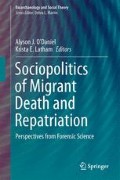Abstract
This chapter moves the focus of migrant death and repatriation from the US-Mexico borderlands to explore a wider geography of migration-related risk, disappearance, and death. Based on ethnographic research with both transit migrants and the families of missing migrants in Oaxaca, Mexico, it examines how individuals and communities grapple with the daily uncertainty of loved ones who have been detained, have disappeared, or have perished during their journeys to the north. Migrant families are not simply victims but engage state and non-state actors, institutions, and mediums as they confront the emotional, legal, scientific, and financial implications of loss. Increasingly, their actions span across borders, creating new openings for solidarity and engagement. As migrant journeys across the globe become more clandestine and dangerous, it is crucial for social scientists to recognize the ways transnational families are being reshaped not only by family separation and deportation but also by disappearance and death.
Access this chapter
Tax calculation will be finalised at checkout
Purchases are for personal use only
Notes
- 1.
For example, this type of militarization became most recently visible with the 2014 implementation of Mexico’s Programa Frontera Sur, a result of US pressure on Mexico in the wake of the 2014 unaccompanied minor “crisis.”
- 2.
For example, one group “Desaparecidos Que Murieron Tras Perseguir El Sueño Americano” has over 25,000 members (https://www.facebook.com/groups/775009732596941/).
References
Abrego, L. J. (2014). Sacrificing families: Navigating laws, labor, and love across borders. Palo Alto: Stanford University Press.
Andreas, P. (2000). Border games: Policing the U.S.-Mexico divide. Ithaca: Cornell University Press.
Boehm, D. (2012). Intimate migrations: Gender, family, and illegality among transnational Mexicans. New York: NYU Press.
Boss P. (2004). Ambiguous loss research, theory, and practice: Reflections after 9/11. Journal of Marriage Family, 66(554), 551–556.
Boss, P. (2006). Loss, trauma and resilience: Therapeutic work with ambiguous loss. New York: Norton.
Cancino, F. (2015). Fosas clandestinas, en 16 estados del país. El Universal.
Carling, J., Menjívar, C., & Schmalzbauer, L.. (2012). Central themes in the study of transnational parenthood. Journal of Ethnic and Migration Studies, 38(2), 191–217.
Coe, C. (2014). The scattered family: Parenting, African migrants, and global inequality. Chicago: The University of Chicago Press.
Comisión Nacional de los Derechos Humanos. (2011). Informe Especial Sobre Secuestro de Migrantes en México. Comisión Nacional de los Derechos Humanos.
De Genova, N. (2004). The legal production of Mexican/migrant ‘Illegality’. Latino Studies, 2(2), 160–185.
De León, J. (2015). The land of open graves: Living and dying on the migrant trail. Berkeley: UC Press.
Délano Alonso, A., Galbraith, P. D., & Nienass, B. (2016). Bringing the dead back into society: An interview with Mercedes Doretti. Social Research: An International Quarterly, 83(2), 511–534.
Dunn, T. (1996). The militarization of the U.S.-Mexico border 1978–1992: Low-intensity doctrine conflict comes home. Austin: Center for Mexican American Studies, University of Texas at Austin.
Heyman, J. M. (1994). The Mexico-United States border in anthropology: A critique and reformulation. Journal of Political Ecology, 1, 43–65.
Holmes, S. (2013). Fresh fruit, broken bodies. Berkeley: University of California Press.
Kearney, M. (2004). Changing fields of anthropology: From local to global. Lanham: Rowman & Littlefield Publishers, Inc.
Lopez, F. H., & Runsten, D. (2004). Mixtecs and Zapotecs working in California: Rural and urban experiences. In G. Rivera-Salgado & J. Fox (Eds.), Indigenous Mexican migrants in the United States. La Jolla: Center for U.S.-Mexican Studies, UCSD.
Martinez, D., Reineke, R., Rubio-Goldsmith, R., Anderson, B., Hess, G., & Parks, B. (2013). A continued humanitarian crisis at the border: Undocumented border crosser deaths recorded by the Pima County Office of the Medical Examiner, 1990–2012. The Binational Migration Institute, The University of Arizona.
McDonnell, P. (2016). ‘Mexico is one big cemetery’: The search for the secret graves of 'the disappeared’. Los Angeles Times.
Mediterranean Missing Project. (2016). ‘Like a part of a puzzle which is missing’: The impact on families of a relative missing in migration across the Mediterranean. Mediterranean Missing: Understanding the Needs of Families and the Obligations of States. The Mediterranean Missing Project.
Nevins, J. (2002). Operation gatekeeper: The rise of the “Illegal Alien” and the making of the U.S.-Mexico boundary. New York: Routledge.
Rosas, G. (2006). The thickening borderlands: Diffused exceptionality and ‘Immigrant’ social struggles during the ‘War on Terror’. Cultural Dynamics, 18(3), 335–349.
Schwartz-Marin, E., & Cruz-Santiago, A. (2016). Pure corpses, dangerous citizens: Transgressing the boundaries between experts and mourners in the search for the disappeared in Mexico. Social Research: An International Quarterly, 83(2), 483–510.
Slack, J., Martínez, D., Lee, A. E., & Whiteford, S. (2016). The geography of border militarization: Violence, death and health in Mexico and the United States. Journal of Latin American Geography, 15(1), 7–32.
Soler, M. S. (2016). Central American Migration. https://movimientomigrantemesoamericano.org.
Stephen, L. (1995). Women’s rights are human rights: The merging of feminine and feminist interests among El Salvador’s mothers of the disappeared (CO-MADRES). American Ethnologist, 22(4), 807–827.
Stephen, L. (2007). Transborder lives: Indigenous Oaxacans in Mexico, California, and Oregon. Durham: Duke University Press.
Urrea, L. A. (2005). The Devil’s highway: A true story. New York: Back Bay Books.
Velasco Ortiz, L. (2005). Mixtec transnational identity. Tucson: University of Arizona Press.
Vogt, W. (2013). Crossing Mexico: Structural violence and the commodification of undocumented central American migrants. American Ethnologist, 40(4), 764–780.
Vogt, W. (2017). The arterial border: Negotiating economies of risk and violence in Mexico’s security regime. International Journal of Migration and Border Studies, 3(2–3), 192–207.
Author information
Authors and Affiliations
Corresponding author
Editor information
Editors and Affiliations
Rights and permissions
Copyright information
© 2018 Springer International Publishing AG
About this chapter
Cite this chapter
Vogt, W.A. (2018). Loss, Uncertainty, and Action: Ethnographic Encounters with Families of the Missing in the Central America-Mexico-United States Corridor. In: Latham, K., O'Daniel, A. (eds) Sociopolitics of Migrant Death and Repatriation. Bioarchaeology and Social Theory. Springer, Cham. https://doi.org/10.1007/978-3-319-61866-1_5
Download citation
DOI: https://doi.org/10.1007/978-3-319-61866-1_5
Published:
Publisher Name: Springer, Cham
Print ISBN: 978-3-319-61865-4
Online ISBN: 978-3-319-61866-1
eBook Packages: Social SciencesSocial Sciences (R0)

